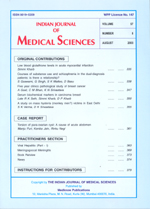
|
Indian Journal of Medical Sciences
Medknow Publications on behalf of Indian Journal of Medical Sciences Trust
ISSN: 0019-5359 EISSN: 1998-3654
Vol. 59, Num. 3, 2005, pp. 116-117
|
Indian Journal of Medical Sciences, Vol. 59, No. 3, March, 2005, pp. 116-117
Letter To Editor
Maternal and perinatal outcome in pregnancy with hypothyroidism
Goel Poonam, Radotra A., Devi K., Malhotra S., Aggarwal A., Huria A.
Department of Obstetrics and Gynaecology, Government Medical College and Hospital, Sector 32-B, Chandigarh
Correspondence Address:Department of Obstetrics and Gynaecology, Government Medical College and Hospital, Sector 32-B, Chandigarh.
E-mail: poonam1302@yahoo.com
Code Number: ms05018
Sir,
Several maternal and foetal complications have been described in patients with overt hypothyroidism.[1] The complications are less in patients with sub clinical hypothyroidism and successful pregnancy outcome in women with hypothyroidism are also known.[2],[3]
We analysed the records of 30 patients with the diagnosis of pregnancy with hypothyroidism from July 1998 to June 2004. According to thyroid function test results 12 patients had sub clinical hypothyroidism (Only elevated TSH), ten were euthyroid on replacement therapy (before pregnancy) and eight had overt hypothyroidism diagnosed in current pregnancy and were started on replacement therapy. Pregnancy complications in the form of pregnancy induced hypertension (PIH), abruption, gestational diabetes (GDM), anemia, post-partum hemorrhage (PPH), low birth weight, foetal distress and congenital malformation were studied. Duration and control of hypothyroidism during pregnancy, change in dosage during pregnancy were also studied.
Age of the patients ranged from 20-35 years and 25 patients were between 20-30 years. Duration of hypothyroidism ranged from eight months to eight years though maximum number of patients was in the range of 1 - 3 years. Out of 30 patients, six had recurrent abortions and four had unexplained stillbirths in past obstetric history. Maternal complications were seen in 15 (50%) women, which were PIH in 10 (33.3%), GDM in 4 (13.3%) and placental abruption in one (0.3%). None of the patients had anemia or PPH. Four babies (13.3%) had low birth weight and 6 (20%) had evidence of foetal distress. There was one stillbirth at 39 weeks. None of the babies had congenital malformation only four (22.2%) out of 18 patients of hypothyroidism on thyroxin required small increase in dose. Duration of hypothyroidism did not correlate with pregnancy outcome.
Hypothyroidism complicating pregnancy is not common, as it is commonly associated with anovulation and infertility.[3] Uncontrolled hypothyroidism is associated with increased incidence of abortions, stillbirths and infertility.[1],[2],[3] In our study, ten (33.3%) patients had poor obstetric outcome in the form of recurrent abortions and unexplained stillbirth. These patients were diagnosed as hypothyroid as a part of investigation procedure for these outcomes and were started on replacement therapy.
It was generally believed that hypothyroid women on maintenance dose rarely require an increase in dosage during pregnancy. A recent study shows that thyroxine requirement increases in majority of patients as early as fifth week of pregnancy and the authors propose that the hypothyroid women should increase their levothyroxine dose by approximately 30% as soon as pregnancy is diagnosed.[4]
Pregnancy with hypothyroidism is associated with higher incidence of maternal complications like PIH and GDM as seen by us.[3] There is also a higher reported risk of anaemia and PPH. Low birth weight in pregnancy with hypothyroidism has been reported to be due to PIH requiring pre-term delivery. However, all of ten patients who developed PIH in our study had only mild PIH and did not warrant delivery before 37 weeks. As seen by us, there is high incidence of fetal distress in pregnancy with hypothyroidism and it has been suggested that hypothyroidism may exert irreversible effect on the fetus and placenta in early pregnancy that impair their subsequent ability to tolerate stress there by increasing the incidence of fetal distress in labour.
To conclude, there should be a high index of suspicion for hypothyroidism in patients with recurrent abortions and unexplained stillbirth. Careful monitoring and control of hypothyroidism during pregnancy and intrapartum period is necessary, since these patients are at increased risk of developing PIH, GDM and fetal distress in labour.
References
| 1. | Davis LE, Levone KJ, Cunniaghman FG. Hypothyroidism complicating pregnancy. Obstetrics and Gynaecology 1988:72;108-12. Back to cited text no. 1 |
| 2. | Casey BM, Dashe JS, Wells CE, McIntire DD, Byrd W, Leveno KJ, et al. Subclinical hypothyroidism and pregnancy outcomes. Obstet Gynecol 2005;105:239-45 Back to cited text no. 2 [PUBMED] [FULLTEXT] |
| 3. | Kumar A, Singh R, Prasad S. Hypothyroidism during pregnancy. Int J Gynaecol Obstet 2004;84:252-3. Back to cited text no. 3 [PUBMED] [FULLTEXT] |
| 4. | Erik K, Marqusee E, Laurens J, Jarolin P, Fischer GA, Larsen PR. Timing and magnitude of increases in Levothyroxine requirements during pregnancy in women with hypothyroidism. N Engl J Med 2004;351:241-9. Back to cited text no. 4 |
Copyright 2005 - Indian Journal of Medical Sciences
|
